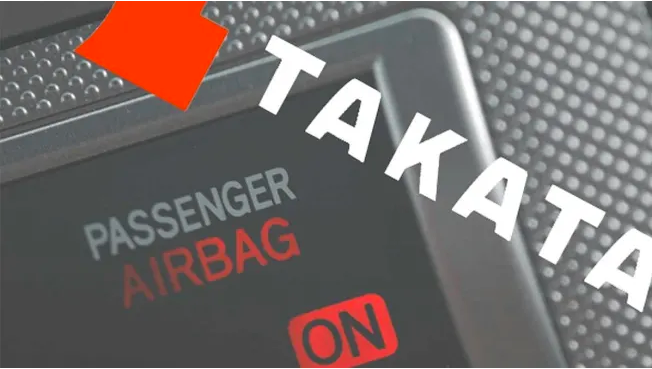Takata Airbag Recall: Everything You Need to Know
What this recall means to you and what actions you should take
By Consumer Reports
Updated June 8, 2021
Vehicles made by 19 different automakers have been recalled to replace frontal airbags on the driver’s side or passenger’s side, or both in what NHTSA has called “the largest and most complex safety recall in U.S. history.” The airbags, made by major parts supplier Takata, were installed in cars mostly from model years 2002 through 2015. Some of those airbags could deploy explosively, injuring or even killing car occupants.
At the heart of the problem is the airbag’s inflator, a metal cartridge loaded with propellant wafers, which in some cases has ignited with explosive force. If the inflator housing ruptures in a crash, metal shards from the airbag can be sprayed throughout the passenger cabin—a potentially disastrous outcome from a supposedly lifesaving device.
NHTSA has determined the root cause of the problem: airbags that use ammonium-nitrate-based propellant without a chemical drying agent. As postulated early on, environmental moisture, high temperatures, and age as associated with the defect that can improperly inflate the airbags and even send shrapnel into the occupant. To date, there have been 19 deaths and more than 400 injuries because this problem in the U.S. Worldwide, NHTSA reports that there have been at least 27 deaths.
Through various announcements, the recall has grown to include 67 million airbags from more than 42 million vehicles in the U.S. The recalls have conducted in waves, prioritized by risk.
Putting the Dangers in Perspective
Seventeen fatalities and more than 200 injuries have been linked to the Takata airbags in the U.S., and in some cases the incidents were horrific, with metal shards penetrating a driver’s face and neck. As awful as they are, such incidents are very rare. In June 2015, Takata stated that it was aware of 88 ruptures in total: 67 on the driver’s side and 21 on the passenger’s side out of what it calculated was just over 1.2 million airbag deployments spread over 15 years. Despite these figures, airbags in general are not a danger. The Department of Transportation estimates that between 1987 and 2012, frontal airbags have saved 37,000 lives.
Based on information provided by Takata and acting under a special campaign by NHTSA, the involved automakers are responding to this safety risk by recalling all vehicles that have these specific airbags. While the automakers are prioritizing resources by focusing on high-humidity areas, they shouldn’t stop there. We encourage a national approach to the risks, as vehicles tend to travel across state borders, especially in the used-car market.
How Important Is It That I Respond to the Recall?
All recalls, by definition, are concerned with safety and should be treated seriously. As with all recalls, we recommend having the work performed as soon as parts are available and the service can be scheduled. Since age has been established as a key factor in most of the Takata airbag ruptures to date, it’s especially important for owners of older recalled cars to get this work done. All recall work will have to be performed at a franchised dealership. Independent mechanics can't perform recall work.
Does It Matter Where I Live?
According to NHTSA, yes. The Takata inflators seem to be vulnerable to persistent high humidity and high temperature conditions, such as in Florida, Georgia, South Carolina, the Gulf Coast states, Hawaii, Puerto Rico and other island territories. However, since a number of confirmed deaths have occurred in places outside the priority recall area, this recall should not be ignored.
NHTSA organizes the American states and territories into three zones, as follows:
Zone A includes Alabama, California, Florida, Georgia, Hawaii, Louisiana, Mississippi, South Carolina, Texas, Puerto Rico, American Samoa, Guam, the Northern Mariana Islands (Saipan), and the U.S. Virgin Islands.
Zone B includes Arizona, Arkansas, Delaware, District of Columbia, Illinois, Indiana, Kansas, Kentucky, Maryland, Missouri, Nebraska, Nevada, New Jersey, New Mexico, North Carolina, Ohio, Oklahoma, Pennsylvania, Tennessee, Virginia, and West Virginia.
Zone C includes Alaska, Colorado, Connecticut, Idaho, Iowa, Maine, Massachusetts, Michigan, Minnesota, Montana, New Hampshire, New York, North Dakota, Oregon, Rhode Island, South Dakota, Utah, Vermont, Washington, Wisconsin, and Wyoming.
Should I Expect to Pay Any Money to Get the Recall Fixed?
Repairs conducted under the recall are FREE, but unrelated problems discovered during the service may not be.
Mercedes-Benz
Mercedes-Benz uses Takata driver’s-side and passenger-side airbags in many vehicles and, is recalling vehicles which use the affected airbags.
Recalled Cars
2005 to 2015 Mercedes-Benz C-Class
2010 to 2011 Mercedes-Benz E-Class
2011 to 2017 Mercedes-Benz E-Class Cabrio
2010 to 2017 Mercedes-Benz E-Class Coupe
2009 to 2012 Mercedes-Benz GL-Class
2010 to 2015 Mercedes-Benz GLK-Class
2009 to 2011 Mercedes-Benz ML-Class
2009 to 2012 Mercedes-Benz R-Class
2007 to 2008 Mercedes-Benz SLK-Class
2011 to 2015 Mercedes-Benz SLS-Class




